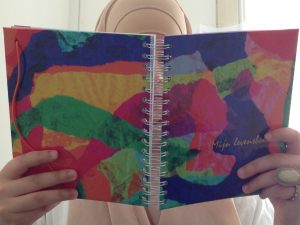“Facebook! WhatsApp!” – shouts one of the Eritrean teenagers. “No, Viber!” – contradicts his friend. The promt for this, was the question: what is your favourite app? I’m in a centre in the north of the Netherlands which accommodates 20 unaccompanied minor refugees. I’m here because we’re conducting an EU-funded Marie Curie project on how these displaced children (aged 14-18) use digital technology and (social) media.
I’m running the focus group in the mentors’ office, while in the kitchen some other boys are listening to Eritrean music. From one of the rooms, I can also hear Arabic music playing. Wherever I went during the two weeks field work in the Netherlands, music was the one constant. Most of the time YouTube was on auto play, and I watched some of the videos together with the teenagers.
“What is it about?”  – I would ask. The girls would start laughing: “Ah it’s too complicated.” “Is it about love?” – I continued. “Yes!”- they’d reply and laugh even harder.
– I would ask. The girls would start laughing: “Ah it’s too complicated.” “Is it about love?” – I continued. “Yes!”- they’d reply and laugh even harder.
In the two weeks spent in the Netherlands, I interviewed 16 unaccompanied refugee children. In that time, I was lucky enough to be invited into their homes. Upon entering I was regularly offered tea, or in one house, a traditional Eritrean cake called Himbasha. Despite their struggles and constant waiting for their families to arrive from a different country, these teenagers were trying their best to live a fairly normal life.

I was also humbled by the work of their mentors. The mentors are employed by a Dutch non-governmental organisation, and have a very important role: to help young refugees adapt to their new country, help them understand the way Dutch society functions and to support them in their everyday life. From applying for a new bus card for the teenagers to asking them about school work, the mentors are basically a new family to them. Some of the mentors I’ve met, have themselves arrived as refugees to the Netherlands. Needless to say, their work is equally demanding and fulfilling.
The final aim of this project is to understand unaccompanied minor refugees’ lived media experiences in order to create media literacy educational materials for them. I hope that our work will be as beneficial as the work I’ve seen done by these mentors.
photo credits: Nidos, RedDishKitchen
I’m very grateful to the non-governmental organisations Nidos and Vitree for their support during this field work.
 YouTube: a look into the future
YouTube: a look into the future










 Fourth INRC Symposium: From Clinical Applications to Neuro-Inspired Computation
Fourth INRC Symposium: From Clinical Applications to Neuro-Inspired Computation ESRC Festival of Social Science 2025 – Reflecting back and looking ahead to 2026
ESRC Festival of Social Science 2025 – Reflecting back and looking ahead to 2026 3C Event: Research Culture, Community & Cookies – Tuesday 13 January 10-11am
3C Event: Research Culture, Community & Cookies – Tuesday 13 January 10-11am Dr. Chloe Casey on Sky News
Dr. Chloe Casey on Sky News Final Bournemouth University publication of 2025
Final Bournemouth University publication of 2025 ECR Funding Open Call: Research Culture & Community Grant – Application Deadline Friday 12 December
ECR Funding Open Call: Research Culture & Community Grant – Application Deadline Friday 12 December MSCA Postdoctoral Fellowships 2025 Call
MSCA Postdoctoral Fellowships 2025 Call ERC Advanced Grant 2025 Webinar
ERC Advanced Grant 2025 Webinar Horizon Europe Work Programme 2025 Published
Horizon Europe Work Programme 2025 Published Update on UKRO services
Update on UKRO services European research project exploring use of ‘virtual twins’ to better manage metabolic associated fatty liver disease
European research project exploring use of ‘virtual twins’ to better manage metabolic associated fatty liver disease